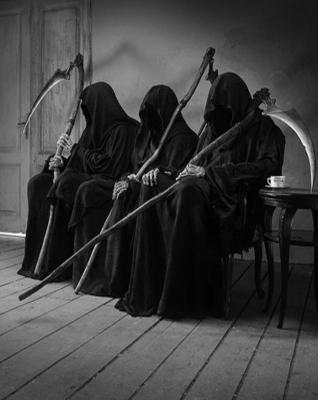People
Death, Be Not Proud
by SANGAT SINGH
After crossing a certain age threshold, you open the morning’s newspaper and automatically zero in on the obituary page to see who is homeward bound.
On this occasion, it was Thomas Varughese, my erstwhile Chief Clerk on the plantation I used to work on. At the age of 81, he had peacefully passed away.
"Our companions are leaving , and we must leave as well to go far away. Death is hovering over our heads.” [GGS: 773.19]
Varughese was a good man, quiet and overly modest, prone to deprecate his own charm and ability, despite being a man of
superlatively high standards and complete integrity.
It was my privilege to know him closely. In losing friends like him, we also die a little.
The funeral was at 10:15 am on 10 October in Seremban, some 70 km
from Kuala Lumpur (Malaysia). I allow myself an extra half an hour to lose my way, as I am always prone to, but mange to reach a tad on time.
There is a sizeable parish community already singing hymns in Malalyam from their ‘gutkas’. They politely offer me a seat. The eldest son approaches me and asks if I would say a few words at the end of the service, as I had known his father well.
I hastily start to scribble some notes on a piece of paper.
This is an impressive Syrian Church ceremony and the priest, accompanied by three assistants, has just arrived. It is easy to spot the head priest from his traditional vestments and a pink broad band around his enormous waist. He must be the top prelate.
They take over with clinical detachment and thenceforth, every minute or so, the priest does the sign of the cross across his heart, followed by all in perfect unison. This happens with the same frequency our granthis exhort the sangat to ‘bolo ji Waheguru’.
While scribbling my notes, I wonder how I should address the head priest. His Emenence? Holiness, Grace or plain Rev. Father?
My fretting proves unecessary. They have run out of time. The service is conducted meticulously, cleansed and sanitized into an almost forensic ethereality with a professional , well-oiled, business-like routine. The priest keeps an eye on his wrist watch, adjusting his baud rate accordingly.
He surveys the scene. He looks at his watch again.
It is now time to pay last respects.
Poor Mrs. Varughese is understandably overwrought. It is a moving sight that wets many an eye. Standing before his coffin, she puts her hand on her deceased husband's forehead and says something softly, probably in her native Malyalam. This is the dissolution of a life-long partnership - a heart-wrenching occasion indeed.
Rev. Father looks at his watch.
Time to move.
He authoritatively announces that it is time to put the cover over the casket, which is then to be taken out, with the legs pointing towards the door.
This was the man who was once the king of his castle!.
"O silly man, no one will keep you even for a moment ... When the pitcher of the body breaks, no one cares for you at all. Everyone says: “Take him away, take him away”. [GGS478:1]
The mother is led by her sons as far as the threshold. How beautifully the whole scene is painted by Bhagat Kabir:
“Sitting on the threshold, his wife weeps and wails; his mother accompanies him to the outer gate. All people and relatives together go to the crematorium, but the swan-soul must go home all alone.” [GGS:1124.11]
Everything in the Syrian service was simple, graceful and serene.
Compared to this, I remember as a child a ‘syaapa’ (wailing) in progress ... a common sight then. This must have been an age old ritual. Even Guru Nanak describes it.
“All the women of his home shout and cry, uttering useless nothings.” [GGS:1412.13]
Pity this syaapa business now appears to be a lost art. It always had some hilarious and comic moments - for onlookers, certainly, if not for the dear old departed soul. To conduct such a syaapa, the group of wailers - professionals all, specially hired for the job - you had to have a leader, a combination of conductor and lead-singer.
I remember, for this there was the ubiquitous Mai Lacho who was much in demand. She would choreograph the wailing and the beating of breasts to a military-like precision. Lacho would lead with a line like: “Oh! where you have gone, there is no light, nor water, nor food, no place to sleep”.
Just then a ‘maraasi’ - minstrel - and his son happened to be passing by, having heard the intoning. The young son tugged his father ‘s sleeve. “Bapu, is he going to our house?”
During the syaapa, if some woman was out of tune or rhythm, Lacho would stare daggers at her, as if saying: “You are spoiling
the siapa, woman! You better practice more when you get home!"
Each culture has its own quaint funerary customs.
In Malaysia and Singapore, there is a sizeable Chinese community. There is also a strong presence of Sikhs in the Police and Armed Forces. The Sikhs are well known for their integrity, loyalty and bravery, and historically were often employed by the rich Chinese as security guards. The Chinese believe in ancestor worship and it was a common practice to have, in funeral services, accompanying baggage for the departing soul: cars, planes, sacks full of currency, household utensils, all fake, of course, drawn down to scale, made of paper and bamboo.
On most such occasions there would also be an effigy of a brave Sikh, complete with turban and 5 Ks. To go along for after-life protection in the next world!
The Chinese are a practical people: In the mid-sixties, my company - Guthrie & Co. - commissioned me to produce a photographic profile of the life on the estates. In the course of carrying out this commission, I spotted a lone Chinese digging a
grave in the cemetery. As a courtesy, I asked him who had died.
“Oh no, ‘Tuan’ (Sir), poor Ah Chong is ‘velly’ (very) sick. Since I had a bit of time on my hands, I thought I would work on the grave that he will to need shortly."
Like the Chinese, Indians have their 'banias’ - as practical and astute a community in money matters as any. The old father had died and the son phoned the local Newspaper office, wanting to find the rates for an obituary.
“Rs 50/- per word” said the clerk.
"Okay, print “Dada dead”.
“No” said the clerk, "you must have at least five words.
So it was worked out.
“Dada dead. Honda for sale.”
Finally, with due respect.
One (das numberia) old village lout and gangster died. A father asked his son to go to the house of mourning and express their condolences to the breaved family. Whilst on the way, the son heard two other villagers talking.
“Good riddance, he is dead, he was such a pain in the neck.”
The son, on reaching the deceased's home, repeated what he had heard by way of consoling the bereaved family. He was promptly beaten and thrown out of the house. When the father saw his son limping back home, he knew he must have said something inappropriate and decided to visit the family himself to apologise to the bereaved family on behalf of his son.
“I am sorry for what my son said. I assure you that the next time someone dies in your family, I will come myself!”
October 15, 2011
Conversation about this article
1: Baldev Singh (Bradford, United Kingdom), October 15, 2011, 9:37 AM.
There is no mourning in Sikhism and the hukam of the Creator, in creating and destroying, is to be accepted in complete humility. Death is as true, real and inevitable, as life is. Guru Arjan tells us that crying for the dead is futile and wrong in every way imagineable because it makes us forget the Creator at a significant time when we should be remembering and uttering the name of Akaal Purakh, the one and only deathless entity.
2: Arvinder (U.S.A.), October 15, 2011, 1:32 PM.
I fully agree with Baldev Singh that we should accept the creation and destruction of life with complete humility, provided it is natural death. What would you say when the 'time to go' is decided by the kith and kin of the person, just because he or she is of an age to go, even if the person is ill but fights endlessly to stay alive. Some children decide these days the time for old people to go to heaven, therefore they provide most inadequate medical support, ask the doctors to take off the life-support systems, etc., because it is time to go and also it is a wastage of money, time and effort to wait for the Creator to send angels to take away these 'useless' souls. So how do you mourn the death of such loved ones whose children call their departure in such a way - "Oh, she died like a queen", or "he died like a king". Please excuse these sentiments, but in a situation like this, one feels so helpless that it even shakes up one's faith.
3: Ajit Singh Batra (Pennsville, New Jersey, U.S.A.), October 16, 2011, 9:56 PM.
"Hukmai andar sabh ko baahr hukam na ko-ay" (Japji Sahib). That is "God rules through His Will and nothing exists outside His Will." Arvinder ji: all deaths are natural deaths. What you are referring to in item#2 is circumstances leading to death. Circumstances come under 'determinism'. Death itself is 'fatalism' as the law of life. And it is in accordance with God's Will.
4: Arvinder (U.S.A.), October 20, 2011, 12:18 AM.
Thank you, Ajit Singh ji, for the reply. I am sorry but I really don't agree with you. If all deaths are natural deaths, then why does the world mourn over the death caused by so-called terrorists or why is there so much hue and cry over females being killed in their mother's wombs as well as after they are born? Is every death in nature's course?




